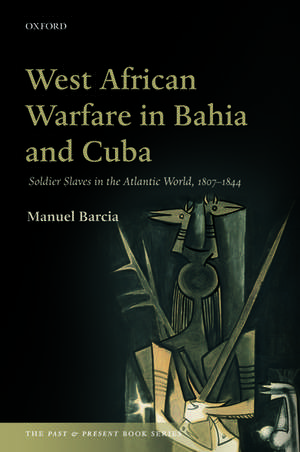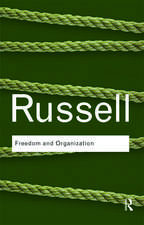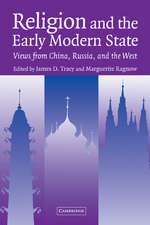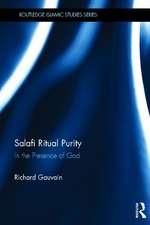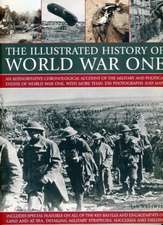West African Warfare in Bahia and Cuba: Soldier Slaves in the Atlantic World, 1807-1844: The Past and Present Book Series
Autor Manuel Barciaen Limba Engleză Paperback – 28 apr 2016
| Toate formatele și edițiile | Preț | Express |
|---|---|---|
| Paperback (1) | 275.25 lei 31-37 zile | |
| OUP OXFORD – 28 apr 2016 | 275.25 lei 31-37 zile | |
| Hardback (1) | 831.24 lei 31-37 zile | |
| OUP OXFORD – 24 sep 2014 | 831.24 lei 31-37 zile |
Din seria The Past and Present Book Series
- 30%
 Preț: 601.95 lei
Preț: 601.95 lei - 18%
 Preț: 168.33 lei
Preț: 168.33 lei - 11%
 Preț: 197.62 lei
Preț: 197.62 lei - 18%
 Preț: 193.11 lei
Preț: 193.11 lei - 12%
 Preț: 193.18 lei
Preț: 193.18 lei - 14%
 Preț: 185.87 lei
Preț: 185.87 lei - 13%
 Preț: 192.68 lei
Preț: 192.68 lei - 25%
 Preț: 521.29 lei
Preț: 521.29 lei - 25%
 Preț: 522.88 lei
Preț: 522.88 lei - 11%
 Preț: 198.24 lei
Preț: 198.24 lei - 12%
 Preț: 193.07 lei
Preț: 193.07 lei - 13%
 Preț: 192.89 lei
Preț: 192.89 lei - 24%
 Preț: 474.14 lei
Preț: 474.14 lei - 18%
 Preț: 310.43 lei
Preț: 310.43 lei -
 Preț: 231.46 lei
Preț: 231.46 lei - 16%
 Preț: 268.72 lei
Preț: 268.72 lei - 26%
 Preț: 546.29 lei
Preț: 546.29 lei - 30%
 Preț: 725.10 lei
Preț: 725.10 lei - 26%
 Preț: 575.78 lei
Preț: 575.78 lei - 15%
 Preț: 558.24 lei
Preț: 558.24 lei - 11%
 Preț: 239.22 lei
Preț: 239.22 lei - 30%
 Preț: 486.62 lei
Preț: 486.62 lei
Preț: 275.25 lei
Preț vechi: 318.07 lei
-13% Nou
Puncte Express: 413
Preț estimativ în valută:
52.68€ • 54.79$ • 43.49£
52.68€ • 54.79$ • 43.49£
Carte tipărită la comandă
Livrare economică 03-09 aprilie
Preluare comenzi: 021 569.72.76
Specificații
ISBN-13: 9780198754268
ISBN-10: 0198754264
Pagini: 206
Ilustrații: 4 maps, 14 black and white illustrations
Dimensiuni: 156 x 234 x 11 mm
Greutate: 0.33 kg
Editura: OUP OXFORD
Colecția OUP Oxford
Seria The Past and Present Book Series
Locul publicării:Oxford, United Kingdom
ISBN-10: 0198754264
Pagini: 206
Ilustrații: 4 maps, 14 black and white illustrations
Dimensiuni: 156 x 234 x 11 mm
Greutate: 0.33 kg
Editura: OUP OXFORD
Colecția OUP Oxford
Seria The Past and Present Book Series
Locul publicării:Oxford, United Kingdom
Recenzii
In this slim but impressive book, Manuel Barcia takes a different path, focusing on the military background of the enslaved Yoruba and Hausa slaves and looks at their impact in Cuba as well as Brazil.
Barcia's book is a very valuable study in a new research field which can be recommended sincerely to colleagues and students.
impressively researched and argued ... [this book should] be welcomed as making new contributions to the field ... show[s] that slaves were active in assessing their own situation and were probably far more aware of what was going on internationally than anyone ever gave them credit for.
serious and precise ... intelligently beyond the traditional scope of the monographic study, offers new and promising avenues for interconnected research ... [this book] aims to demonstrate that practices of slave resistance in the Americas were not traces of a "survival", but rather a continuous adaptation which is an extension of their [African] history.
remarkable ... Barcia demonstrates great originality in using, in part, archival sources from Brazil and Cuba towrite African history. In so doing, he provides amodel for future scholarship. Sources for pre-twentieth century African history are relatively scarce, but Barcia shows thatwe can learn much by examining documents in the Americas ... move[s] us well beyond our decades-long obsession with comparisons between slavery in the US South and all other places [and opens] up new possibilities for future comparative histories and tell us much about slavery in two parts of the Americas that received tremendous numbers of enslaved Africans in the nineteenth century.
Barcia has done a fine job of matching up large and complex literatures and of plotting a novel path for understanding the interconnected nature of Yorubaland, Hausaland and the Americas in the nineteenth century.
Barcia's book is a very valuable study in a new research field which can be recommended sincerely to colleagues and students.
impressively researched and argued ... [this book should] be welcomed as making new contributions to the field ... show[s] that slaves were active in assessing their own situation and were probably far more aware of what was going on internationally than anyone ever gave them credit for.
serious and precise ... intelligently beyond the traditional scope of the monographic study, offers new and promising avenues for interconnected research ... [this book] aims to demonstrate that practices of slave resistance in the Americas were not traces of a "survival", but rather a continuous adaptation which is an extension of their [African] history.
remarkable ... Barcia demonstrates great originality in using, in part, archival sources from Brazil and Cuba towrite African history. In so doing, he provides amodel for future scholarship. Sources for pre-twentieth century African history are relatively scarce, but Barcia shows thatwe can learn much by examining documents in the Americas ... move[s] us well beyond our decades-long obsession with comparisons between slavery in the US South and all other places [and opens] up new possibilities for future comparative histories and tell us much about slavery in two parts of the Americas that received tremendous numbers of enslaved Africans in the nineteenth century.
Barcia has done a fine job of matching up large and complex literatures and of plotting a novel path for understanding the interconnected nature of Yorubaland, Hausaland and the Americas in the nineteenth century.
Notă biografică
Manuel Barcia is Professor of Latin American History at the University of Leeds. He is also an Honorary Fellow at the Wilberforce Institute for the Study of Slavery and Emancipation at the University of Hull. He co-edits Atlantic Studies: Global Currents, and is the author of two books and several articles focusing on the history of the African Diaspora in Latin America and the Caribbean. He is also a frequent contributor to The Washington Spectator, The Huffington Post, The Independent, and Al Jazeera in English. In 2014 he was awarded a prestigious Philip Leverhume Prize in History, given every year to researchers whose work has already attracted international recognition and whose future career is exceptionally promising.
